Dr. Mardy's Quotes of the Week ("Cat Lovers Versus Dog Lovers")
April 13-19, 2025 | THIS WEEK'S THEME: “Cat Lovers Versus Dog Lovers"
Opening Line of the Week
These are the opening words to the book’s Prologue, and they immediately pull readers into Knapp’s world. After a lovely description of dog-human communication that resulted in their snuggling together under the covers, Knapp continued:
“I have fallen in love with my dog. This happened almost accidentally, as though I woke up one morning and realized: Ooops! I’m thirty-eight and I’m single, and I’m having my most intense and gratifying relationship with a dog. But we all learn about love in different ways, and this way happens to be mine, through a two-year-old, forty-five pound shepherd mix named Lucille.”
For well over 2,000 memorable opening lines from every genre of world literature, go to www.GreatOpeningLines.com.
This Week’s Puzzler
On April 13, 1949, this man was born in Portsmouth, Hampshire, England to parents who met while serving in the Royal Navy during WWII. As a boy, he was an avid reader—and clearly precocious—but unlike most bookish lads, he would quickly become intense and argumentative when he was challenged. After attending two of England’s most prestigious boarding schools, he went on to Balliol College, Oxford, where he studied philosophy, politics, and economics—all while sharpening the debating skills that would later become his trademark.
As a young man, his targets were predictable for a left-leaning Baby Boomer who came of age during the Vietnam War: the war itself, the conservative ideology behind the war, racial and economic injustice, and the hypocrisy of organized religion. After graduating from Oxford in 1970, he spent a year traveling across the United States before returning to London to spend the next ten years writing for such publications as The New Statesman, The Daily Express and The Evening Standard.
He experienced moderate success as a journalist in England, but it wasn’t until his move to the U. S. in 1980 that his career began to soar. Over the next three decades, he wrote eighteen books—many of them New York Times best-sellers—and well over a thousand essays and columns for such prestigious publications as The Nation, Vanity Fair, Slate, Harper’s, and The Atlantic.
While he described himself as a “democratic socialist” and a “liberal” in his early years, he shocked most of his old friends when, after years of writing critical articles about Ronald Reagan, George H. W. Bush, George W. Bush, and American foreign policy in general, he announced his support in 2002 for the America-led war in Iraq.
The New York Times described him as “a slashing polemicist in the tradition of Thomas Paine and George Orwell.” Armed with a quick wit and a willingness—even an eagerness—to go for the jugular, he turned his intellectual firepower on many public figures, and even on religion itself.
In a 1995 bio of Mother Teresa—iconoclastically titled The Missionary Position—he wrote: “Mother Teresa is less interested in helping the poor than in using them as an indefatigable source of wretchedness on which to fuel the expansion of her fundamentalist Roman Catholic beliefs.” In a highly critical 1999 biography of Bill Clinton—provocatively titled No One Left to Lie To— he meticulously discussed Clinton’s character flaws and the methods he used to conceal them. In the book, he described Hillary Clinton as more of an enabler than a wronged wife—and when the book came out in paperback, he subtitled it The Values of the Worst Family.
Along with Richard Dawkins, Sam Harris and Daniel Dennett, he was one of “The Four Horsemen of New Atheism.” He wrote two books on the subject, both published in 2007: God Is Not Great: How Religion Poisons Everything and The Portable Atheist: Essential Readings for the Non-Believer.
On Dec. 15, 2011, he died at age 62 from complications related to esophageal cancer. He’d been diagnosed sixteen months earlier, and when he eventually revealed the diagnosis in a Vanity Fair article, he gave it a characteristically clever title: “Topic of Cancer.”
No matter how weighty or serious the topic, this week’s Mystery Man was always able to bring his trademark wit to bear. In his “Topic of Cancer” article, for example, he wrote: “In whatever kind of a ‘race’ life may be, I have very abruptly become a finalist.” And in the Introduction to The Portable Atheist, he wrote:
Who is this person?
Are You a Cat Lover or a Dog Lover?
I did a Substack post on the subject of dogs early in 2024, and followed it up with a post on cats a month later. I knew back then that I’d eventually be doing a third post on how the owners of cats and dogs compare the two species—and that time has now arrived.
Those two earlier posts laid the groundwork for what I’ll be saying below, so if you’re new to my efforts, you might want to go back and read them before diving into this week’s post. The dog issue may be seen here. And the cat issue here.
A Historic Rivalry.
History is full of great rivalries. Coke vs. Pepsi. Yankees vs. Red Sox. Men vs. Women. East vs. West. But no rivalry has been more enduring—or more fascinating—than the one that has existed for millennia between people who love cats and those who love dogs.
While it’s clearly possible to love both, most people gravitate toward one or the other—and their preference for one species is generally accompanied by a certain disdain for the other. You saw an example in this week’s Puzzler, where our Mystery Man offered his own version of a popular generalization about dogs and cats.
For the most part, the rivalry between cat and dog lovers is played out in small towns, suburban neighborhoods, city playgrounds, retirement communities, and the many other venues where representatives of each “camp” live alongside each other. Occasionally, though, these rivalries can take on a life of their own, and that’s exactly what happened in 1988, when a spirited exchange unfolded between Caroline Knapp, a Boston writer, and Ron Rosenbaum, a Manhattan journalist.
It all started with the publication of Knapp’s best-selling 1988 memoir Pack of Two: The Intricate Bond Between People and Dogs (you will recall the title from my “Opening Line of the Week” feature above). In Knapp’s memoir, she wrote lavishly about the benefits of dog ownership:
While dog owners were enthusiastic about the book, cat owners were not—especially Ron Rosenbaum, who loved his cat Stumpy as much as Knapp loved Lucille. Stumpy was a stray cat with a severely injured tail originally found by a cat rescuer on the Brooklyn waterfront. After a local veterinarian amputated a portion of the tail—hence “Stumpy”—Rosenbaum adopted him.
Rosenbaum so fundamentally disagreed with Knapp’s central thesis that he felt he had to set the record straight. Here’s how he expressed his motivation some time later: “I felt it necessary to take on the myth of the superiority of dog-love (even the existence of dog-love) as exemplified in Caroline Knapp’s Pack of Two, a well-written but deeply deluded paean to her shameless flatterer dog Lucille.”
“Stumpy Versus Lucille: The Great Pet Debate.”

A few months after reading Knapp’s book, Rosenbaum wrote an August 1998 article in the New York Observer titled “Stumpy Versus Lucille: The Great Pet Debate.” In addition to singing the praises of his “insanely intriguing and heroic cat, Stumpy,” Rosenbaum wrote some of the most disparaging things ever written about dogs, including:
As he continued, there was much more in the same vein:
“Dogs are skilled at sucking up, creating the pathetic illusion of love, but it has nothing to do with how lovable you actually are. Dogs will slaver over anyone who gives them food and security. Dogs will suck up to serial killers, dogs will make goo-goo eyes at child molesters, dogs will fawn and whimper over mass murderers.”
“A dog, as someone said, always acts like he’s afraid he’s going to lose his job. A cat acts like the employer, you’re the ranch hand—and you’re always in danger of losing your job. A cat’s vast sense of entitlement may be delusive, but at least it’s honest: A cat does not fake orgasms of affection the way dogs do, a cat is not an easy lay emotionally. If you win the love of a cat you have something meaningful, you have something that can genuinely increase your self-respect.”
After this scathing attack on “man’s best friend,” dog lovers around the world were excited when, two months later, Knapp published a spirited rejoinder in the Boston Phoenix. She began this way:
And she continued to throw shade in the remainder of the article, writing:
”Cats are narcissistic. Their needs come before ours. They don’t understand the word “No.” They carry themselves with that aloof, arrogant sense of perpetual entitlement, they will jump up and insinuate themselves wherever they please—on your lap, on your newspaper, on your computer keyboard—and they really couldn’t care less how their behavior affects the people in their lives. I’ve had boyfriends like this; who needs such behavior in a housepet?”
“Dogs are pack animals, conditioned over 14,000 years of domesticity to orient their instincts and capacity for attachment towards humans. The fact that cats are aloof and disdainful by comparison doesn’t mean they’re more discerning or intellectually superior or equipped with higher self-esteem; it simply means they have poor social skills.”
“Dogs bond with us. Dogs interact with us, they read and respond to our moods and body language. Dogs, in a word, live in relation to us. Cats, on the other hand, live apart from us: behind those blank stares, they occupy a mysterious world very much of their own, and while this is not necessarily a bad thing, it makes cats most suitable for people who are not interested in a mutually involving or high-maintenance relationship with an animal.”
Even though I’m neither a dog nor a cat lover, I found myself getting so interested in the Stumpy-Lucille rivalry, that I looked forward to future installments. Sadly, none came—and none will. On June 3, 2002, Knapp died at age 42 of lung cancer.
A lifelong non-smoker, Knapp was diagnosed just two months before she died. Reports of her death shocked her many fans—including me—around the world. A month before she died, she fulfilled one of her lifetime dreams by marrying her longtime friend and companion, photographer Mark Morelli. Her beloved Lucille also played an active role in the ceremony.
So, to return to our original question, are you a cat lover or a dog lover? In the comment section below, feel free to tell me where you stand, and why. Before you do anything, though, take a few moments to peruse this week’s compilation of quotations on the subject:
Dogs have owners, cats have staffs. — Author Unknown
Dogs teach you how to love. Cats teach you how to live. — Arline Bleecker
Dogs are high on life. Cats need catnip. — Mary Bly
Dogs will come when called. Cats will take a message and get back to you. — Missy Dizick
Dogs serve people, but people serve cats. — Temple Grandin
If animals could speak as fabulists have feigned, the dog would be a blunt, blundering, outspoken, honest fellow, but the cat would have the rare talent of never saying a word too much. — Philip Gilbert Hamerton
We own a dog–he is with us as a slave and inferior because we wish him to be. But we entertain a cat–he adorns our hearth as a guest, fellow-lodger, and equal because he wishes to be there. — H. P. Lovecraft
Dogs want only love but cats demand worship. — L. M. Montgomery
A man who owns a dog is, in every sense of the word, its master; the term expresses accurately their mutual relations. But it is ridiculous when applied to the limited possession of a cat. — Agnes Repplier
If a dog jumps in your lap, it is because he is fond of you. If a cat does the same thing, it is because your lap is warmer. — Alfred North Whitehead
For source information on these quotations, and more on the theme of CATS, go here. For DOGS, go here. And for CATS & DOGS, go here.
Cartoon of the Week:
Answer to This Week’s Puzzler
Christopher Hitchens (1949-2011)
Dr. Mardy’s Observation of the Week
Thanks for joining me again this week. See you next Sunday morning, when the theme will be “The Pursuit of Happiness.”
Mardy Grothe
My Two Websites: www.drmardy.com and www.GreatOpeningLines.com
Regarding My Lifelong Love of Quotations: A Personal Note

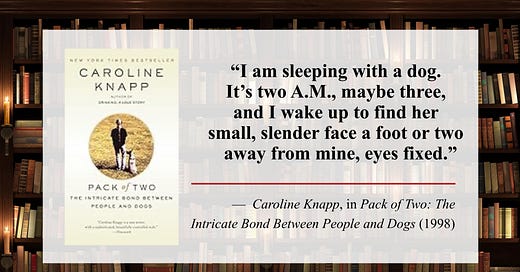



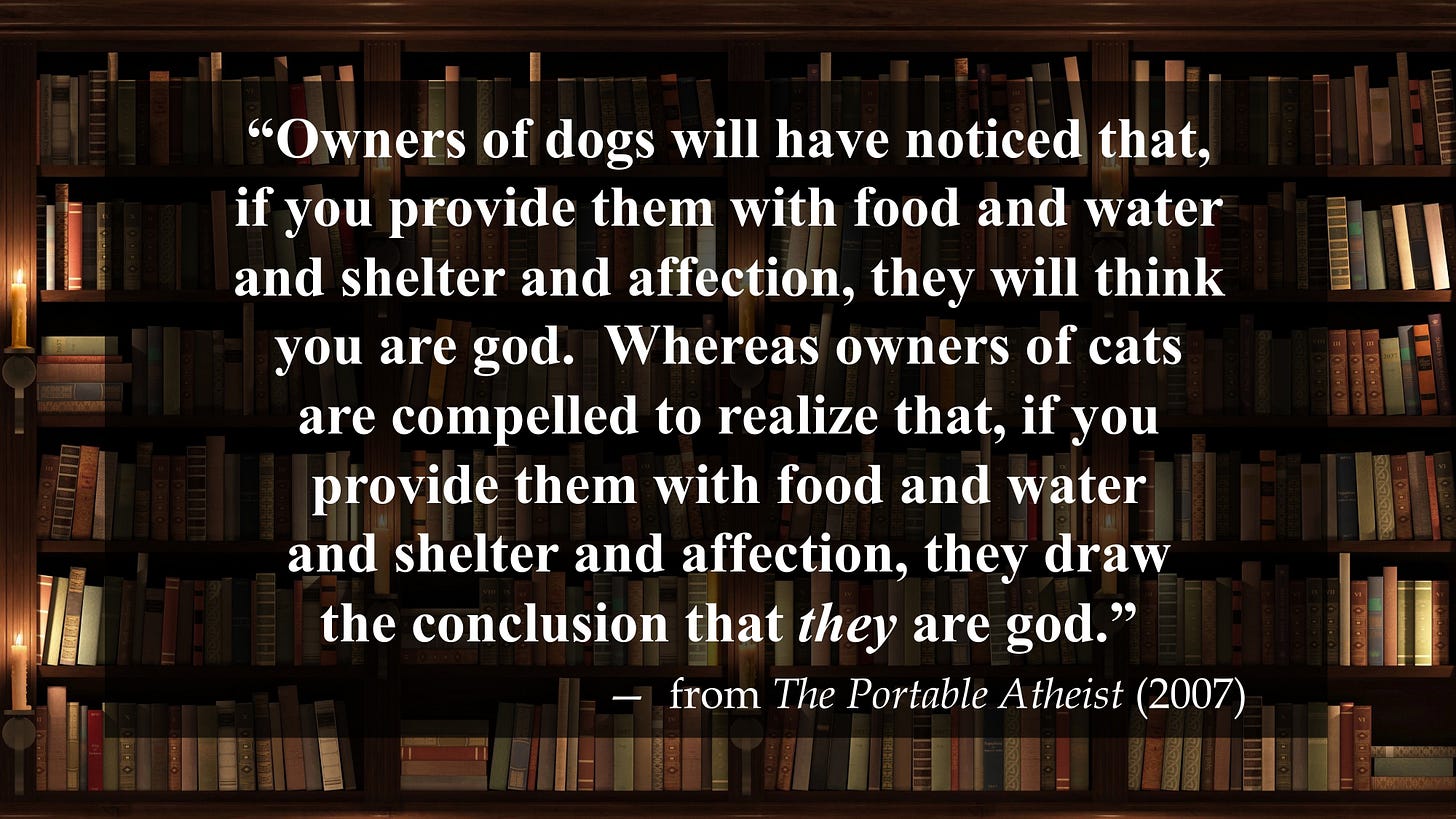

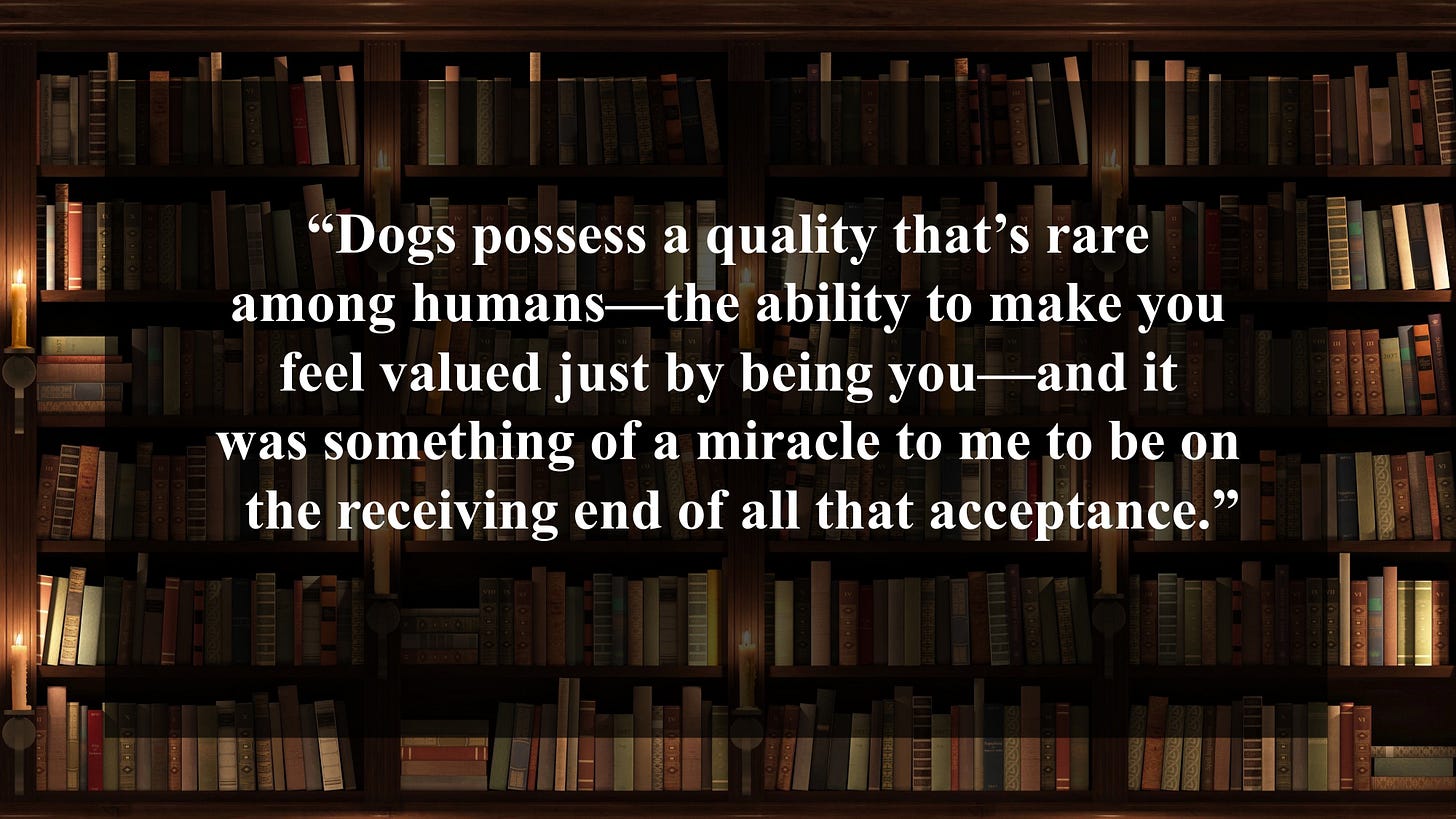
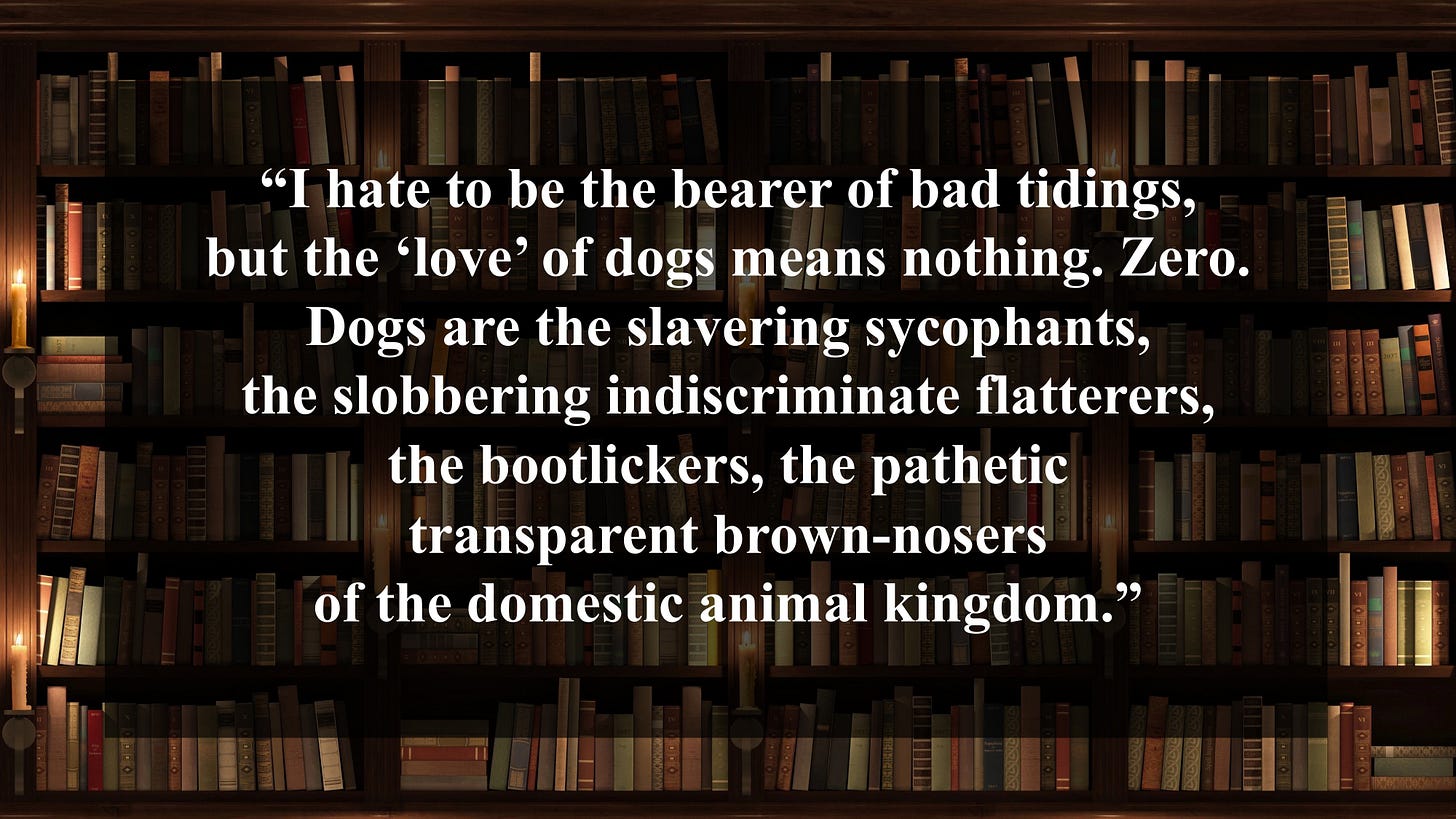
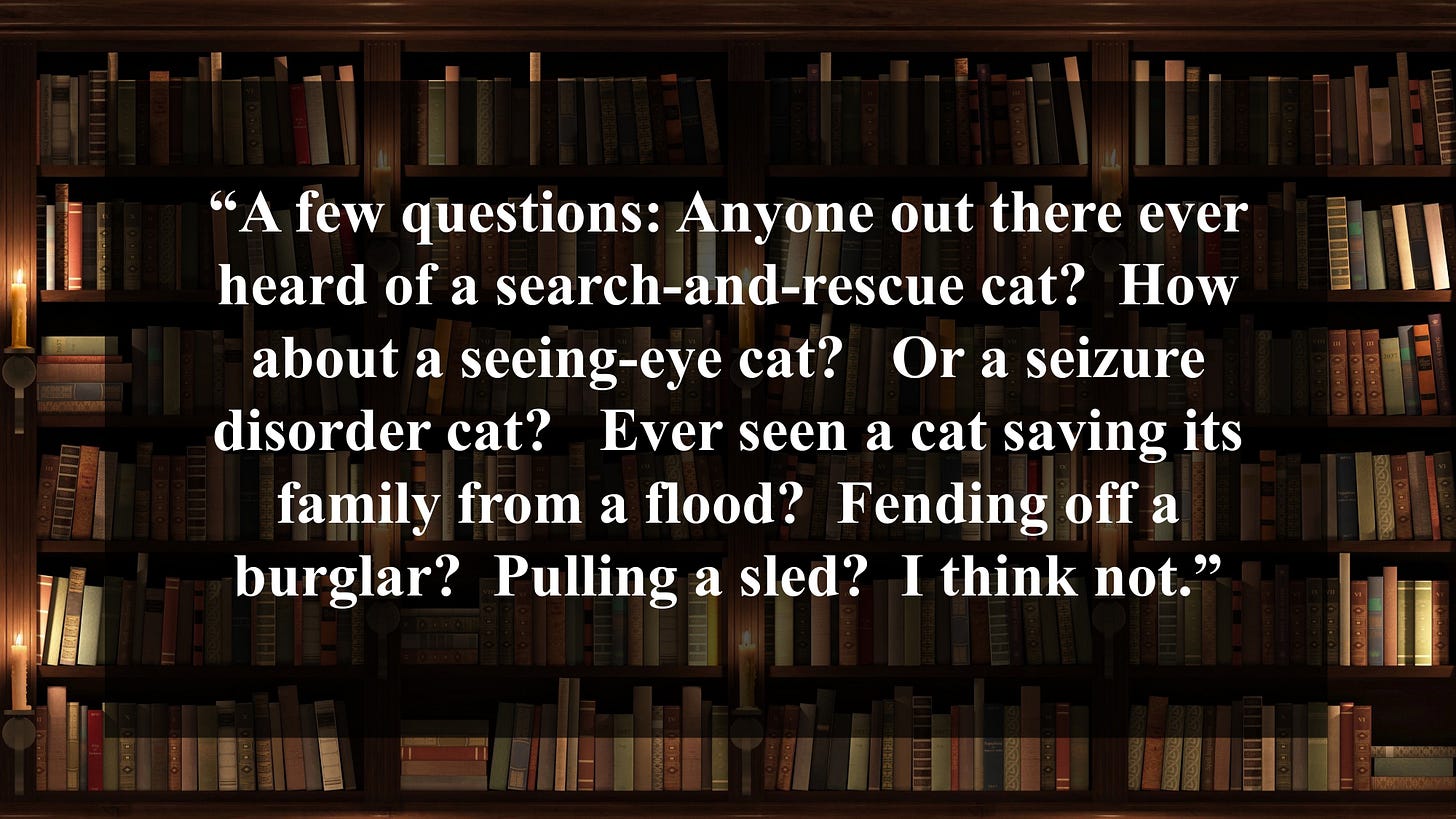

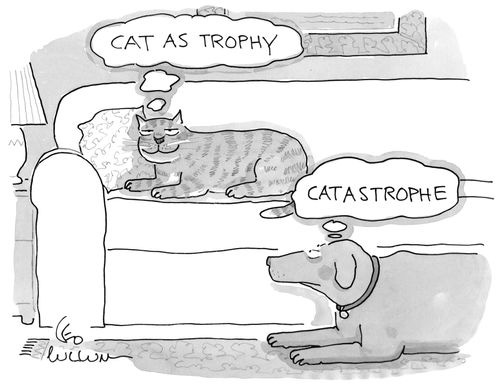

Tribute to my pal, Ceasar 1963-1968
By Brent Scott 2024
Ceaser was our caramel colored cat. He was my pal. He was the only one home when I got home from the sixth grade. We fed a stray too who was too skittish to be pet yet. Big cat. We called him Mister Whiskers.
Sitting in the afternoon sun on the top step of the front porch. Four steps down to the walkway, out the gate to the sidewalk by the street. The low chain link gate was open.
Ceaser was at my right side. Sitting upright. Looking.
From seemingly nowhere a large dog raced in the gate barking wildly and was charging Ceaser and me.
Before I even reacted Ceaser leapt straight off the porch and onto the dog’s face.
The dog collapsed like a house of cards and scrambled to its feet, out the gate, and down the sidewalk from whist it came.
Ceaser watched the dog till it was gone, turned, and slowly walked back up the walkway, up the five steps, and sat where he was before it all happened.
1. I've never seen or heard of domestic cat, whose human companion has just said, "Oh, he doesn't bite," sneak up and take a chunk out of another human's calf. 2. I've never been kept awake half the night by a cat barking at nothing. I prefer coyotes and wolves to domesticated dogs. At least they're honest with their intentions..